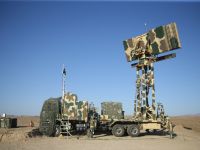Israel considers that its ultimatum for the Palestinians to halt violence expired unheeded on Monday, Israeli government spokesman Avi Pazner told AFP.
"We have seen no sign that Arafat has given orders for the violence to stop," he said.
"It is true that there have been fewer attacks, but that is because there were fewer targets during Yom Kippur (the most holy day of Judaism, which wound up at nightfall), but they are still firing on our soldiers and our settlements," the former ambassador to Paris and Rome said.
When asked about the Palestinian police action to disperse demonstrators in Gaza on Sunday, Pazner said they were just "playing to the gallery."
Earlier, Israeli acting Foreign Minister Shlomo Ben Ami said there was no sign of an end to the violence raging in the Palestinian territories as UN chief Kofi Annan kicked off a mission to prevent a Middle East conflagration.
And Ben Ami said there would be no Israeli-Palestinian summit if the violence that has claimed almost 100 lives in 12 days continued to blaze in the West Bank and Gaza Strip.
Ben Ami was speaking ahead of a crucial cabinet meeting to be chaired by Israeli Prime Minister Ehud Barak, who had warned the Palestinians that peacemaking would be halted if there was no halt to the unrest by Monday evening.
"Israel sees no sign on the ground that the violence has stopped," he told a joint press conference in Tel Aviv with Annan.
On a summit, he added, "We believe that such a gathering can take place only if we come to it after violence is stopped.
"It is irrelevant to go to such a meeting in an atmosphere of violence in the territories and in this state of relations between us and the Palestinian Authority."
Annan, who is due to meet Palestinian leader Yasser Arafat later Monday and Barak only on Tuesday, said he wanted to bring the two sides back to the negotiating table.
"Our first objective is that the action must shift from the streets to the bargaining table. The bloodshed must stop and the conflict must not be allowed to spread," he said.
Annan is aiming not only to end the deadly Israeli-Palestinian violence but also to defuse a potential confrontation over the kidnapping of three Israeli soldiers by Lebanese Hizbollah guerrillas.
The seizure of the soldiers during clashes on the Israel-Lebanon border was the first major eruption of violence since Israel's withdrawal from its northern neighbor in May after 22 years of occupation.
"I have not come with any magic formula or solution," Annan cautioned. "Time is short, stakes are high, the price of failure is more than anyone of us wants to pay."
"I am hopeful that we can control the situation but this cannot be done by the leaders alone," he added.
A UN spokeswoman said earlier that Annan was expected to be in the region between two and four days. Other officials said he might also visit Syria and Lebanon.
Sources in Barak's office said that the cabinet meeting on the crisis would start at 10:30 p.m. (2030 GMT), later than originally scheduled, because of consultations he was holding with security officials.
Israeli television reported that Annan's aides were annoyed that Barak was not meeting the UN chief on Monday, suggesting that the Israeli prime minister was protesting at a recent UN Security Council resolution condemning an "excessive use of force" by Israeli forces on Palestinian demonstrators.
During the height of the unrest last week Israel used helicopter gunships, tanks, rockets and live ammunition against Palestinians armed with rocks, Molotov cocktails and sometimes assault rifles -- (AFP)
© 2000 Al Bawaba (www.albawaba.com)







